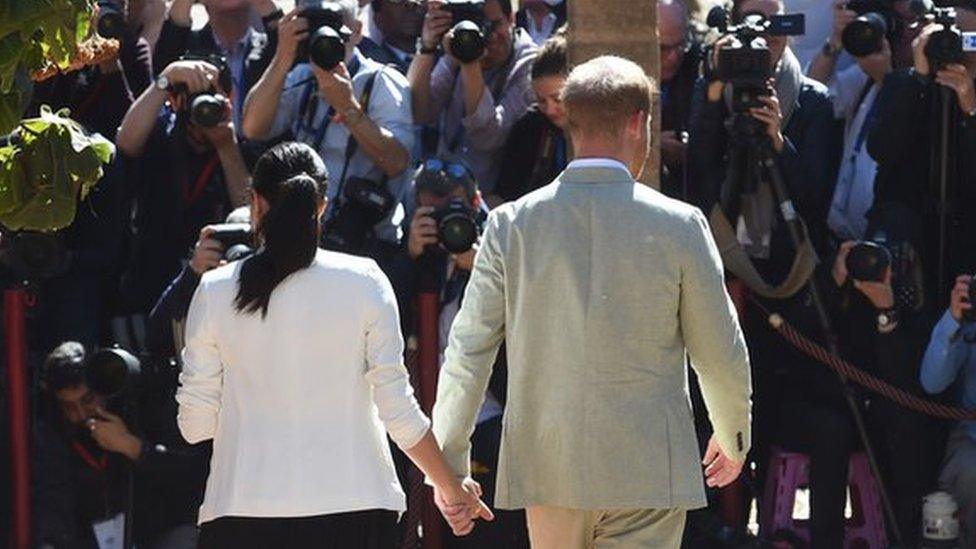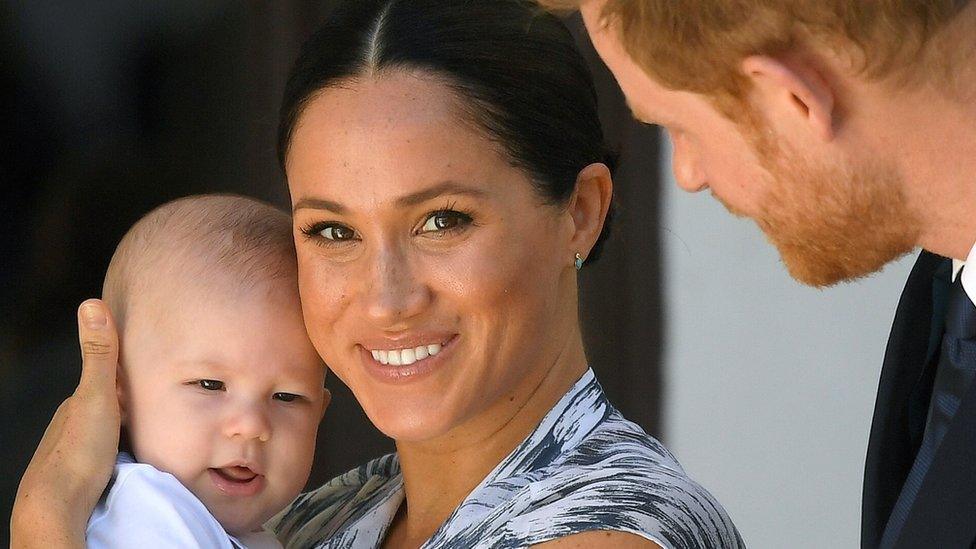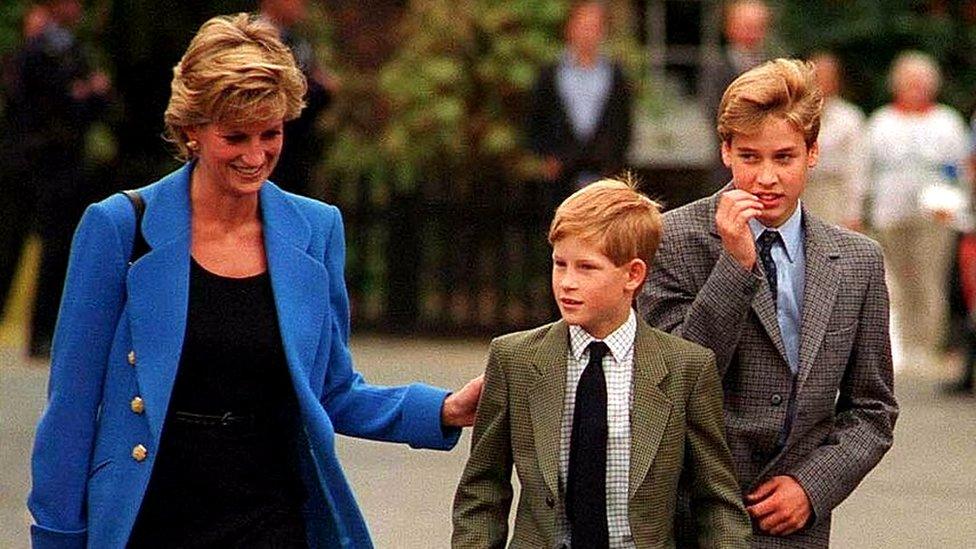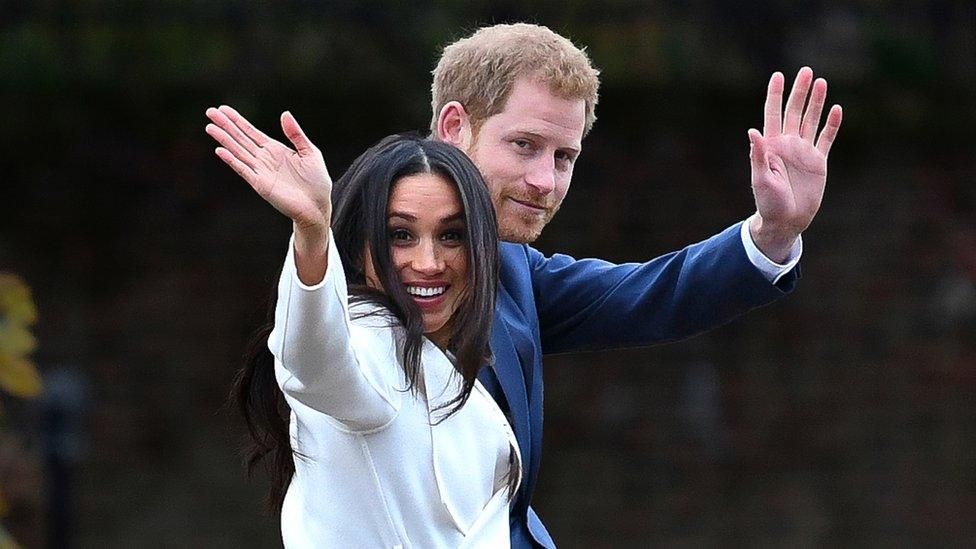Could royal couple's move make media intrusion worse?
- Published

It is a truth universally acknowledged that for a modern monarchy to retain the support of the public it cannot be too interesting.
Prince Harry is very interesting. He says and does interesting things. This means he gets in the news rather a lot.
If you look back over the reign of Queen Elizabeth II, the House of Windsor has faced greatest jeopardy when it has been most newsworthy.
The Queen mostly stays out of the news; her opinions are largely unknown.
The same is broadly true of Prince William, who only adopts issues - such as mental health - which are not politically partisan.
There is not much interest in their views, frankly, because the Queen and Prince William do not set out to say interesting things. Other royals do.
Before her death, Princess Diana was probably the most famous person in the world. Her opinions on a range of matters, and talent for playing the media, were widely known.
Prince Charles' opinions on a range of issues, from homeopathy to architecture, are familiar.
In recent times, as his ascension presumably nears, he has dialled down his public pronouncements on many issues.
From a media management point of view, the Duke and Duchess of Sussex, who might currently be the most famous couple on the planet, are just far too interesting for the House of Windsor right now.
Tabloid troubles
Mix their fame and strained relations with other royals, together with the fact they belong to the Instagram generation, and - in Prince Harry's case - have instinctively despised much of the media for decades, as a result of his mother's death, and you have a toxic brew.
And that's before you add in the disastrous recent Prince Andrew interview, which gave every indication of a Firm in which nobody, from a public relations point of view at least, has a grip, or even a clue.
In their detailed and clearly long-planned announcement of a new media strategy, the duke and duchess issued several soothing words about their support for a free and fair press, but their enmity was impossible to conceal.
They made an interesting distinction between royal correspondents and their editors, suggesting the former often report stories accurately only for their editors in London to put an opinionated or inaccurate spin, or headline, on their work.

The duke and duchess visited southern Africa last year with their son Archie
In his furious statement last October, Prince Harry singled out Britain's tabloid newspapers, saying that they had ruined his mother's life and he wouldn't let them ruin his wife's.
It is impossible for any of us to imagine what life must be like with the degree of intrusion, and lack of privacy, that relentless tabloid pressure can put on a family.
Here it has driven a young couple to say they will relocate for half the year.
And a lot of people don't like tabloid culture full stop.
But it is worth saying that the tabloids have got some of their coverage of Prince Harry and Meghan right.
The fact that the couple flew on Elton John's private jet, having made many pronouncements about the environment, is a legitimate story.
For several months, tabloid reporters in Britain have been writing that there were tensions between Prince Harry and his brother, that a formal split in operations within the family could be imminent, and that the Queen was not being kept fully aware of their plans.
This story has proved correct: Prince Harry admitted some of it on camera to ITV's Tom Bradby.
And this week, Dan Wootton of the Sun was the first to report that the couple were thinking of moving overseas. He got the scoop , externaland deserves credit for that.
Generational shift
For many years, royal coverage has operated through the royal rota system.
A bit like the lobby in Westminster, this gives privileged, approved journalists access to the royals in exchange for deeper reporting and - the Windsors hope - more positive coverage.
The Duke and Duchess say they will pull out of the system.
Tabloid journalists are furious at this perceived declaration of war. But Prince Harry and Meghan went further still in saying they will still give access to journalists - it's just they'll favour younger reporters or those who support causes close to their heart.
This couldn't be better calculated to enrage Britain's tabloid press.

Prince Harry has previously has said that tabloid newspapers ruined his mother's life
The key point here is generational. Princess Diana spent years cultivating journalists, with long lunches and phone calls.
In the 1990s, if you wanted to build relations with the public, journalists were the filter you had to go through.
Prince Harry and Meghan Markle belong to the Instagram generation.
They believe they can use social media and their own website to appeal directly to the public, and shape their own public narrative.
They have much less emotional attachment to, and (as they see it) less need for, newsprint, or even broadcast news bulletins.
A chasm is likely to open up, between what they say about themselves online - and what others in traditional media have to say about them.
The huge challenge they face stems from the fact that traditional media, while much weaker, are far from dead: tabloid newspapers and TV and radio bulletins reach millions of people in Britain every day. They're going nowhere fast. They still have influence.
It therefore does matter - albeit less than it once did - if your relations with, for instance, royal correspondents at the Daily Mirror and Daily Mail deteriorate.
There is something desperately sad for the couple in the fact that, even in North America, you cannot get away from scrutiny - given that every passer-by has a smartphone.
Right now, there are journalists in Britain having conversations at home and at work in which they make clear they expect to be travelling to Canada quite a bit in coming months. Some of them will have already booked tickets.
If you want to stay out of the media, it's not about where you are, it's about who you are and what you do.
Don't be too interesting. Ironically, this week has radically increased interest in this curiously modern young family.
In other words - even if he changed his name back to Henry David - for the young prince and his family, who desperately want to be left alone, it's too late.
- Published9 January 2020
- Published8 January 2020

